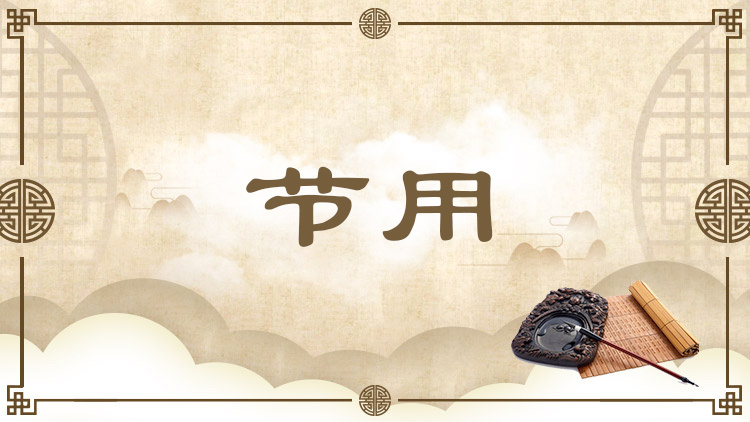
节省用度。“节用”是对待物质财货的一种态度,即节约使用财货,减少不必要的财货消耗。“节用”常特指为政者不滥用自己所掌握的权力攫取民财,以满足自己的需求或行铺张浪费之事。为政者的“节用”体现着对百姓的关爱。儒家、墨家等不同学派都有“节用”的主张,但对于节省的标准和尺度,各家有着不同的认识。
Jieyong means economy, or frugality of usage. Jieyong is an attitude regarding material property; that is, using property sparingly and reducing its unnecessary consumption. This term was often used to point out that those in government should not abuse the powers of their office to seize wealth from the people to meet their own needs or for extravagances. Jieyong in those who govern is a manifestation of their care and concern for their people. Different schools of thought like the Confucians and the Mohists all advocated jieyong, but they had different views about its criteria and scope.
引例 Citations:
◎子曰:“道千乘之国,敬事而信,节用而爱人,使民以时。”(《论语·学而》)
孔子说:“治理有千辆兵车的大国,要严肃对待政事而有信用,节省用度而关爱百姓,役使民众要遵循农时的安排。”
Confucius said, "When governing a powerful state which is a thousand chariots strong, one must be dedicated and trustworthy, act economically, show love for others, and have the people serve their corvée during the right seasons." (The Analects)
◎是故古者圣王制为节用之法,曰:凡天下群百工,轮、车、鞼、匏、陶、冶、梓匠,使各从事其所能。曰:凡足以奉给民用,则止。诸加费不加于民利者,圣王弗为。(《墨子·节用中》)
因此古时候的圣王制定了节用的原则:使天下各行的工匠,造车轮的、造车的、制作皮革的、烧制陶器的、冶炼金属的、打造木质器具的,各自从事自己所擅长的工作。足以供给民众使用了,就可以了。那些增加耗费而不增加民众利益的事情,圣王都不会去做。
Therefore, the ancient sage-kings laid out the principles of economy as follows. For all the craftsmen on the land, whether they are wheelwrights or carriage builders, tanners or potters, whether they work with metal or wood – let them all make the best use of their skills. Stop once they have made enough to meet the needs of the people. Sage-kings do not do things which increase expenditures without bringing benefits to the people. (Mozi)
推荐:教育部 国家语委
供稿:北京外国语大学 外语教学与研究出版社
责任编辑:钱耐安





